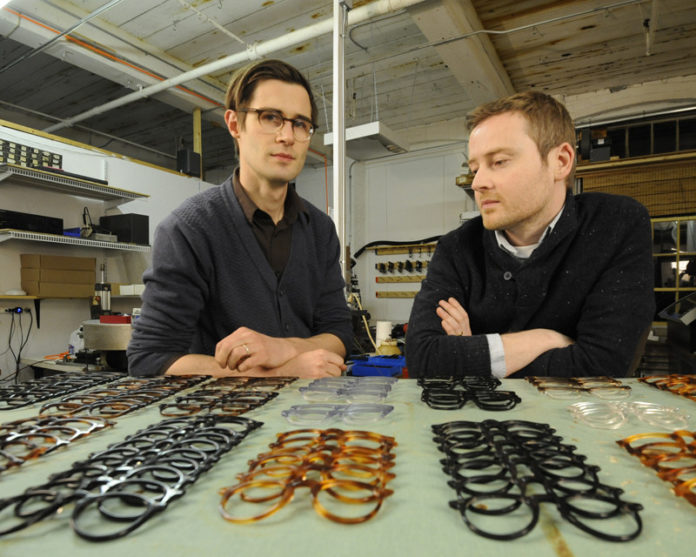
When a company dies, the people, knowledge and equipment it accumulated over its history often scatter across the region or country, leaving little visible trace of its existence.
Sometimes, vestiges of the company sprout up again in smaller, unpredictable forms like Lee Allen Eyewear, the boutique Providence-Fall River eyeglass maker that’s risen from the ashes of the late Martin Copeland brand.
For the last three years, Lee Allen co-founders Lee Kuczewski and Declan Halpin have been making hand-crafted and bespoke eyeglass frames using Martin Copeland’s old machines, outfitting notables such as outgoing Rhode Island School of Design President John Maeda and David Letterman band leader Paul Shaffer.
With solid demand for its frames, Lee Allen is now exploring expansion and the challenges inherent in scaling a boutique operation.
“I think handmade is always going to be big part of what we do and, even if we scale up, that will be a big part of our studio,” Kuczewski said. “But I think there is no reason both of those things couldn’t happen. From a business model it is such a massive market.”
Kuczewski got into the frame-making business from the lens side of eyeglasses; he’s an optician who also works for Providence Optical on Westminster Street.
While studying how to recommend and cut lenses, Kuczewski became increasingly intrigued by the frames those lenses go in and began tinkering with making his own homemade designs.
In 2008, he discovered Andrew Cloutier, a former Martin Copeland employee who had purchased some of the manufacturing equipment from the defunct eyewear maker and was in the process of setting it up at a shop in Attleboro to make glasses and other plastic products like dice.
Martin Copeland had been part of a sizeable Rhode Island eyeglass-making industry through the middle of the 20th century that couldn’t survive the globalization of manufacturing in the 1990s.
Kuczewski asked Cloutier to let him apprentice at his shop, an offer that was resisted at first, but eventually accepted so Kuczewski could help get the machines back up and running.
Working at the shop, BK Optical, gave Kuczewski the chance to learn the long and complicated process of manufacturing his own frame designs, but the apprenticeship was cut short when Cloutier died in 2010.
Kuczewski had made a small number of custom frames with friend Declan Halpin, a computer-aided-design consultant who has worked with the yacht-building, jewelry and other manufacturing industries.
The two had gotten to know each other through their interest in experimental music and decided to buy the Cloutier machinery together and start Lee Allen Eyewear.
While still living in Providence, they set up their frame-making machines in an old Fall River mill and launched a website showing some of their more unique designs.
In addition to made-to-order custom frames, Lee Allen also makes limited-edition designs sold at high-end shops in Providence, New York and Chicago, plus some private-label lines. Custom frames now make up about 20 percent of sales.
Looking ahead, Kuczewski said the equipment and employees needed to make the same quality frames on a larger scale will cost about $500,000 and they are considering approaching investors.
Another question facing Lee Allen is whether to pursue direct sales through their website or, as they do now, work through brick-and-mortar retailers.
For the optician in Kuczewski, the rise of Internet eyeglass sales is bittersweet.
While Internet brands like Warby Parker have made fashionable frames easier and less expensive to buy, having glasses fitted by a computer is not a substitute for having it done by a human, he said.
Along with Internet sales, another technology that could change the industry is 3-D printing, which could someday replace the old machines used now.
With Halpin’s computer-aided-design background, Kuczewski said Lee Allen may explore 3-D printing, which currently doesn’t work with the materials used to make frames.
“It is more a limitation of materials than anything else,” Kuczewski said about 3-D printing. “But that is something we are looking at closely.” •
COMPANY PROFILE
Lee Allen Eyewear
OWNERS: Lee Kuczewski and Declan Halpin
TYPE OF BUSINESS: Eyeglass frames
LOCATION: 1 West St., Fall River
EMPLOYEES: 2
YEAR ESTABLISHED: 2010
ANNUAL SALES: NA











